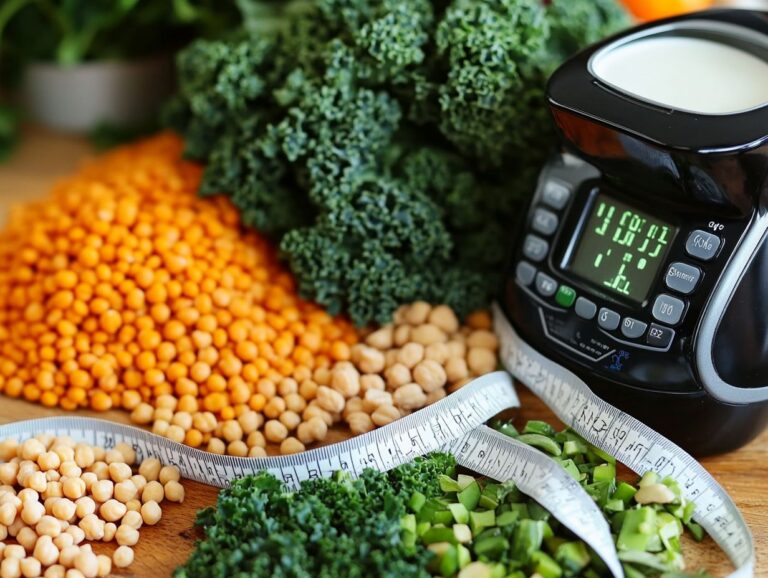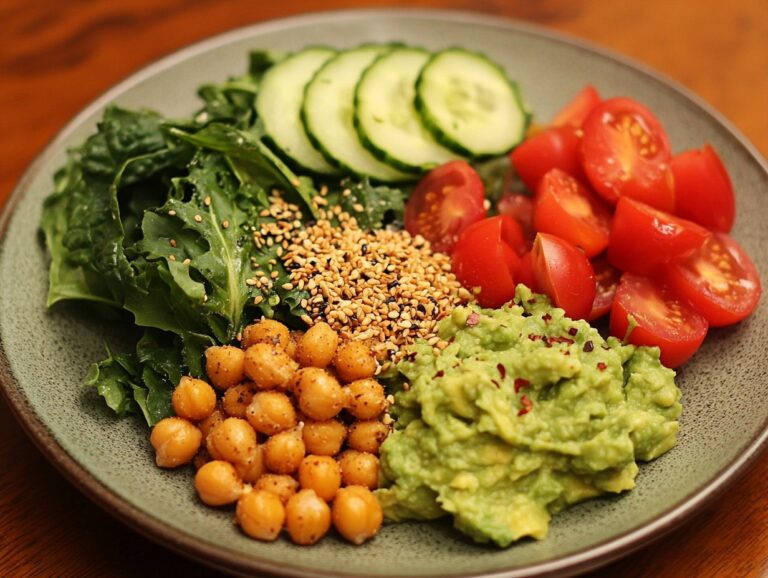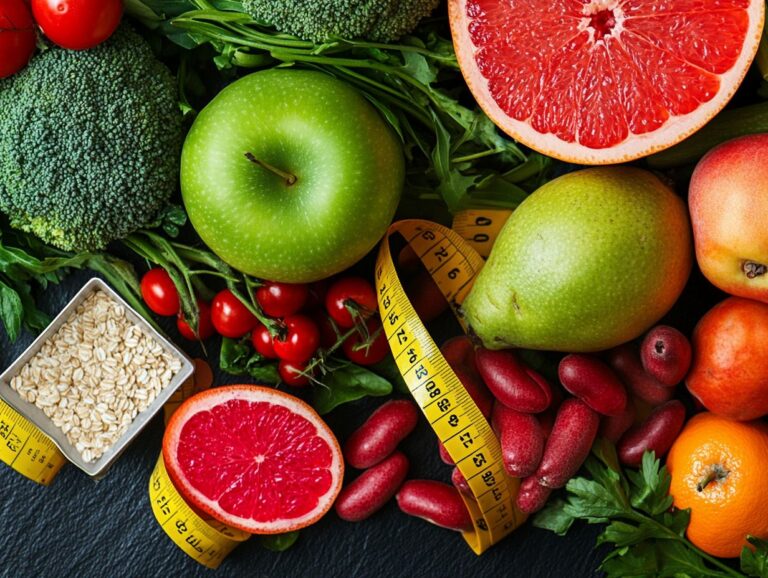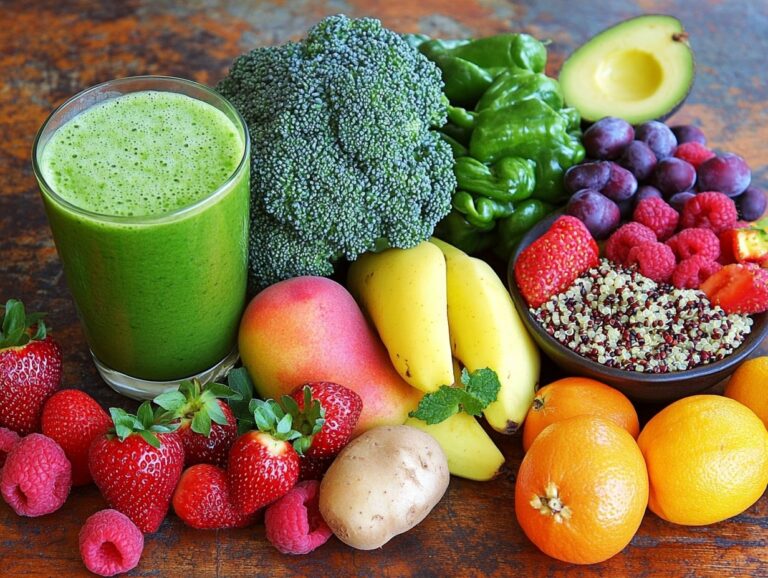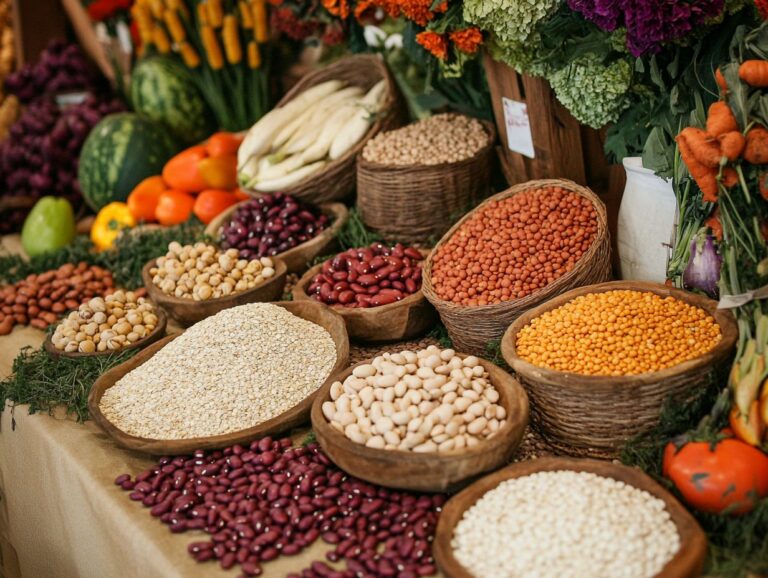Curious about the ins and outs of a vegan diet? From ethical motivations to health benefits highlighted in numerous studies, the reasons for choosing this lifestyle are as diverse as the delicious plant-based meals it offers. Understanding the financial implications is just as crucial. This article explores the cost of a vegan diet including food prices and grocery bill, highlights potential benefits and drawbacks, and provides tips for budget-friendly shopping. Whether you’re considering going vegan or simply looking to save money, you’ll find valuable insights here.
Key Takeaways:
- A vegan diet may lead to weight loss, lower risk of chronic diseases, and improved digestion.
- Nutrient deficiencies and higher grocery costs are potential downsides of a vegan diet, highlighting the importance of nutritional comparison with a meat-based diet.
- Factors that affect the cost of a vegan diet include location, access to fresh produce, and dietary preferences.
What Is a Vegan Diet?
 A vegan diet is a dietary pattern that excludes all animal products, including meat, dairy, and eggs, while emphasizing whole plant-based foods such as fruits, vegetables, beans, legumes, whole grains, and plant-based proteins. Veganism is rooted in ethical, environmental, and health beliefs, and it has been extensively researched for its potential health benefits and compatibility with sustainable food systems. According to the Physicians Committee for Responsible Medicine, founded by Hana Kahleova, MD, PhD, a well-planned vegan diet can provide all the necessary nutrients individuals need and can lead to positive health changes, as well as a reduced risk of chronic diseases.
A vegan diet is a dietary pattern that excludes all animal products, including meat, dairy, and eggs, while emphasizing whole plant-based foods such as fruits, vegetables, beans, legumes, whole grains, and plant-based proteins. Veganism is rooted in ethical, environmental, and health beliefs, and it has been extensively researched for its potential health benefits and compatibility with sustainable food systems. According to the Physicians Committee for Responsible Medicine, founded by Hana Kahleova, MD, PhD, a well-planned vegan diet can provide all the necessary nutrients individuals need and can lead to positive health changes, as well as a reduced risk of chronic diseases.
Why Do People Choose a Vegan Diet?
The reasons people choose a vegan diet can be categorized into ethical, environmental, and health concerns. Numerous studies on veganism emphasize the significant motivations behind this dietary shift. Ethical motivations often stem from a desire to avoid causing harm to animals. Environmental concerns are typically associated with the substantial impact of animal agriculture on climate change and food waste. Health-related reasons include potential benefits such as weight loss, reduced insulin resistance, and a lower risk of chronic diseases, all supported by clinical research from experts like Marco Springmann.
1. Ethical Reasons
The ethical rationale for a vegan diet is rooted in the belief that abstaining from animal products is more humane and aligns with the principles of responsible medicine and animal welfare. This ethical argument emphasizes the importance of animal welfare, particularly given that modern agriculture often prioritizes profit over humane treatment. Intensive farming practices frequently result in significant suffering for animals, raising important ethical questions about consumption. By adopting a vegan lifestyle, individuals can reduce their direct involvement in this suffering and promote a societal shift towards more ethical consumption practices. Recommendations for plant-based diets from organizations such as the Physicians Committee for Responsible Medicine indicate that not only can personal health be enhanced through these diets, but ethical living can also be fostered, contributing to a more compassionate world that recognizes the rights of all living beings.
2. Environmental Reasons
There are compelling environmental reasons to choose a vegan diet, particularly due to the significant impact of animal agriculture on greenhouse gas emissions, deforestation, and food waste. Research indicates that livestock production accounts for up to 14.5% of all human-induced greenhouse gas emissions more than the entire transportation sector combined. Every year, millions of square miles of forest are cleared to create pastureland, which severely disrupts biodiversity and contributes to the extinction of thousands of species. By adopting plant-based diets, individuals can support sustainable food systems that promote regenerative agriculture while also reducing their carbon footprint, leading to economic advantages in the fight against climate change. Studies have shown that embracing a vegan lifestyle can reduce carbon emissions by up to 50%.
3. Health Reasons
Health benefits associated with a vegan diet are supported by clinical evidence demonstrating that well-planned plant-based diets can offer significant advantages, including weight loss and a reduced risk of chronic diseases such as cardiovascular disease and type 2 diabetes. Studies have shown that individuals following a vegan diet tend to consume fewer calories, leading to significant savings on groceries, while still obtaining a wide range of nutrients, thanks to a high intake of fruits and vegetables, legumes and grains, and whole grains. These food groups are rich in essential vitamins and minerals that enhance insulin sensitivity, which is crucial for managing blood sugar levels. Clinical comparisons indicate that a vegan diet is higher in fiber than most meat-inclusive diets, resulting in greater health benefits. This leads to a notable improvement in cardiovascular health markers and a reduced risk of obesity-related conditions.
What Are the Benefits of a Vegan Diet?
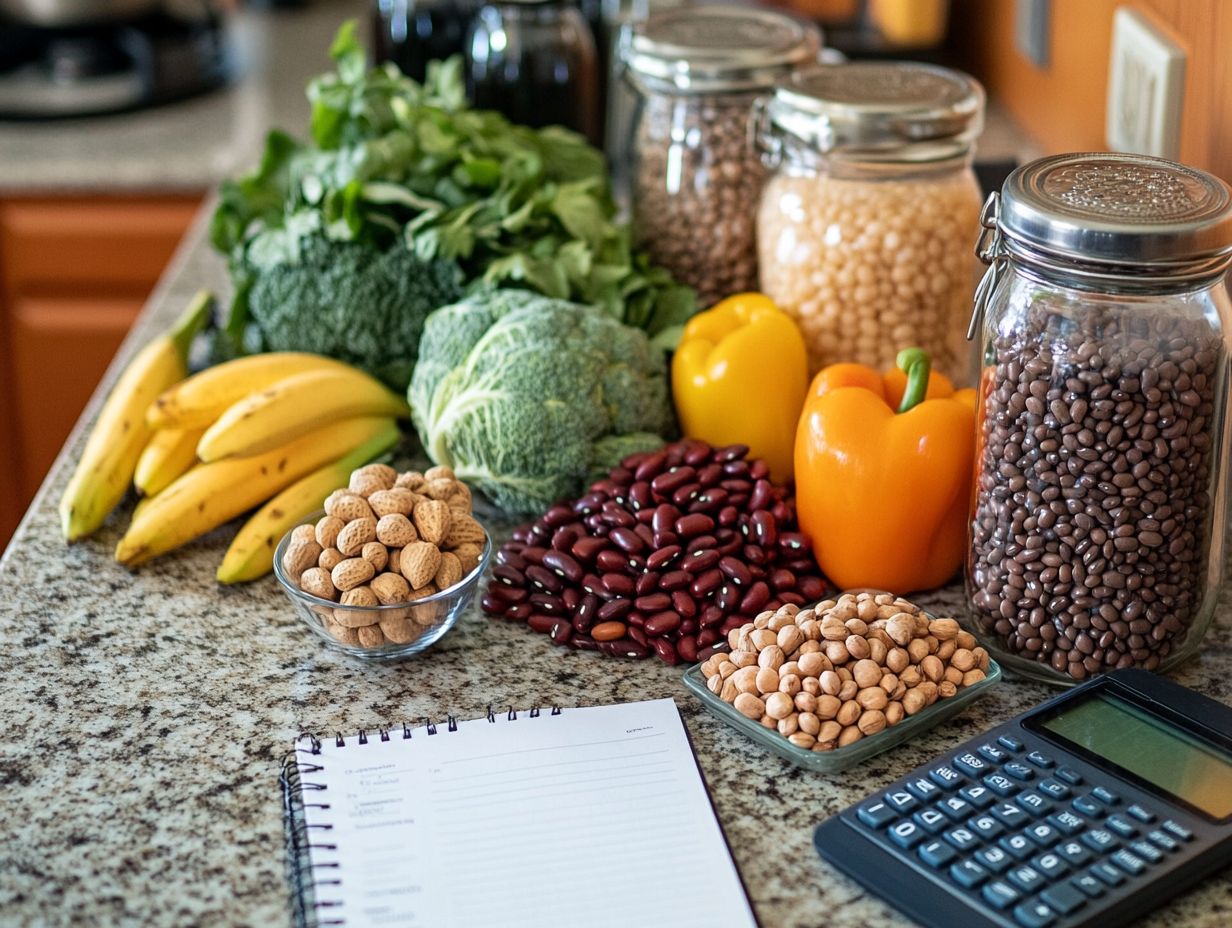 A vegan diet offers several benefits, including improved health, significant weight loss, and a reduced risk of chronic diseases, as confirmed by studies published in JAMA Network Open and Lancet Planetary Health. These advantages have been documented in numerous studies and publications, including JAMA Network Open and Lancet Planetary Health.
A vegan diet offers several benefits, including improved health, significant weight loss, and a reduced risk of chronic diseases, as confirmed by studies published in JAMA Network Open and Lancet Planetary Health. These advantages have been documented in numerous studies and publications, including JAMA Network Open and Lancet Planetary Health.
1. Weight Loss
The most significant advantages of a vegan diet include its potential for weight loss, primarily due to lower caloric intake, as well as various health benefits associated with consuming a wide range of fruits, vegetables, and whole grains. These foods provide essential vitamins and minerals, along with increased levels of plant-based proteins and dietary fiber, which contribute to improved feelings of fullness and reduced overall hunger, leading to cost savings on food expenses. Research indicates that individuals following a vegan diet tend to have lower body mass indexes (BMIs) compared to those on more meat-inclusive diets. A study published in the Journal of the American College of Nutrition found that participants on a vegan diet lost significantly more weight over an 18-week period compared to those on a conventional diet.
2. Lower Risk of Chronic Diseases
Studies indicate that individuals following a vegan diet have a lower incidence of chronic diseases, including heart disease, type 2 diabetes, and hypertension, according to clinical research. These studies highlight the nutritional benefits of a plant-based diet rich in fruits, vegetables, whole grains, legumes, nuts, and seeds. This type of diet is associated with higher consumption of essential micronutrients, vitamins, and minerals, contributing to better overall well-being. Additionally, the high fiber content of these foods supports digestive health and aids in weight management.
3. Improved Digestion
A vegan diet offers several health benefits, including improved digestion, primarily due to its high dietary fiber content from fruits, vegetables, legumes, and grains. This fiber promotes regularity and helps prevent constipation. Research indicates that fiber-rich diets encourage the growth of beneficial gut bacteria, which can enhance overall gut health. A study published in the journal Nutrients found that a higher intake of plant-based foods was associated with increased bowel transit time and a reduced risk of digestive disorders. Additionally, soluble fiber found in beans and oats may help lower cholesterol and blood sugar levels, further improving digestive health and nutrient absorption.
What Are the Potential Downsides of a Vegan Diet?
While a vegan diet offers numerous advantages, it also presents potential drawbacks that individuals should be aware of. These drawbacks include an increased risk of nutrient deficiencies and a potentially higher grocery bill following the dietary transition.
1. Nutrient Deficiencies
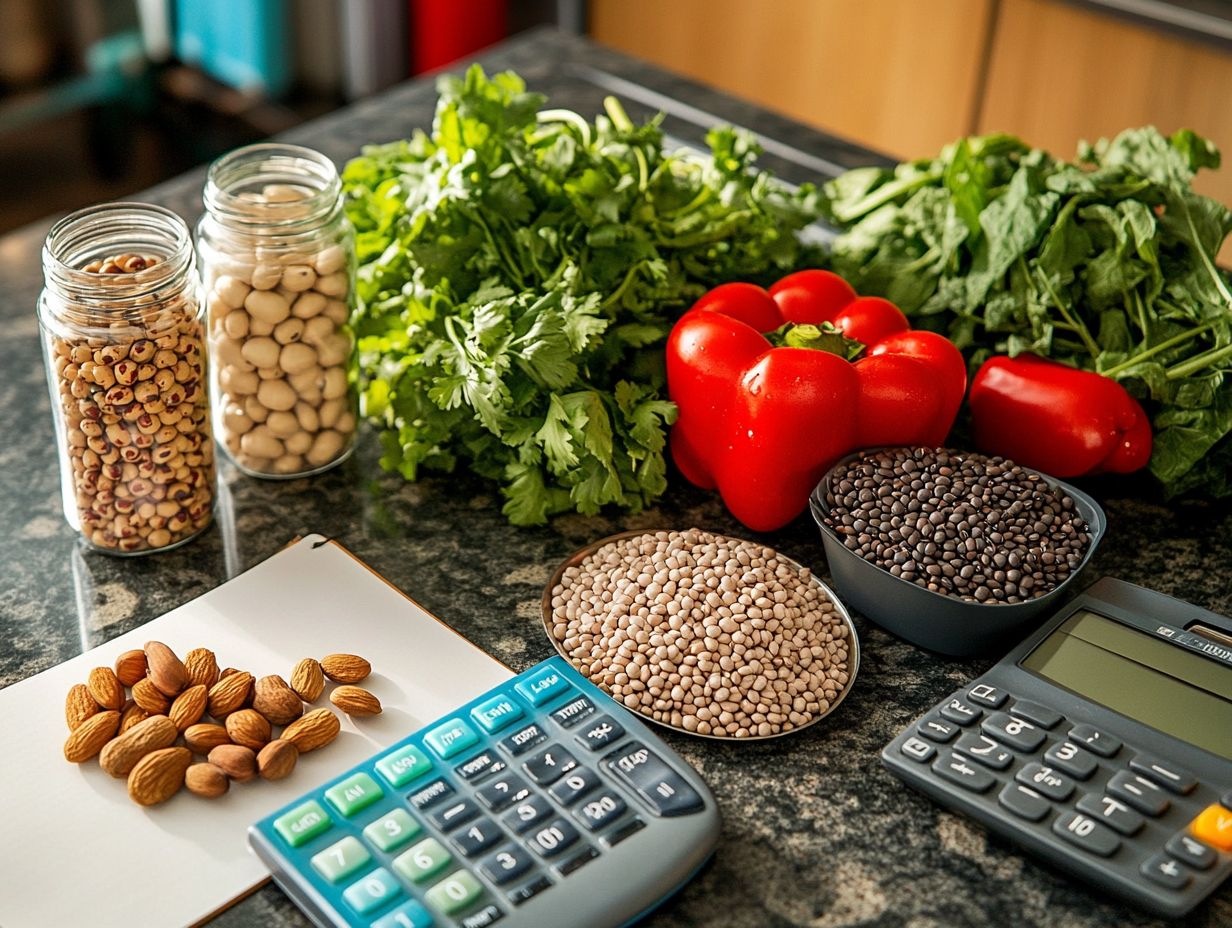 Nutrient deficiencies pose a significant risk for vegans, particularly when dietary tracking does not ensure the inclusion of essential vitamins and minerals. This risk is heightened due to a vegan diet’s potential inadequacy in key nutrients such as vitamin B12, iron, omega-3 fatty acids, and calcium, as noted in the National Nutrition Survey conducted by the U.S. Department of Agriculture. Monitoring daily food intake and evaluating diets for deficiencies can help pinpoint these nutritional gaps. By maintaining a detailed log of meals, individuals can identify specific intake patterns that contribute to nutrient deficiencies. To mitigate these risks, it is beneficial to incorporate fortified foods like:
Nutrient deficiencies pose a significant risk for vegans, particularly when dietary tracking does not ensure the inclusion of essential vitamins and minerals. This risk is heightened due to a vegan diet’s potential inadequacy in key nutrients such as vitamin B12, iron, omega-3 fatty acids, and calcium, as noted in the National Nutrition Survey conducted by the U.S. Department of Agriculture. Monitoring daily food intake and evaluating diets for deficiencies can help pinpoint these nutritional gaps. By maintaining a detailed log of meals, individuals can identify specific intake patterns that contribute to nutrient deficiencies. To mitigate these risks, it is beneficial to incorporate fortified foods like:
- Plant milks
- Breakfast cereals
- Nutritional yeast
as well as high-quality supplements when necessary.
2. Higher Grocery Costs
Many people perceive that a vegan diet is more expensive, particularly due to specialty items and organic produce, which can increase overall grocery bills and food costs. However, this perception may not fully reflect the financial realities of vegan grocery shopping. While some specialty vegan products, such as vegan cheeses and meat alternatives, can be pricier than conventional meat products, staples like beans, rice, lentils, and seasonal vegetables are often more affordable. Purchasing whole foods in bulk can also lower costs over the long term. Additionally, local farmers’ markets and community-supported agriculture (CSA) programs offer access to fresh produce at more reasonable prices, helping to manage food expenses. By shopping sales and using coupons, individuals can further enhance affordability, making a vegan lifestyle achievable even on a tight budget.
How Much Does a Vegan Diet Cost Per Week?
The cost of a vegan diet can vary significantly based on several factors, leading to questions about both the average weekly expenses and the daily cost associated with following a plant-based diet, especially when compared to a meat-based diet. Studies on veganism have shown significant savings on groceries due to these dietary patterns.
1. Factors That Affect Cost
The cost of a vegan diet is influenced by various factors, including the types of foods purchased, grocery shopping habits, and the availability of convenience foods. Additionally, food price data from the U.S. Department of Agriculture highlights the economic advantages of a plant-based diet over traditional diets that include animal products. Type of Food: Seasonal produce is generally more affordable and healthier than imported or out-of-season fruits and vegetables. For instance, buying tomatoes and zucchinis in the summer can significantly reduce grocery bills compared to purchasing them in the winter, when prices tend to rise. Additionally, making bulk purchases can lead to considerable savings; buying legumes and grains in large quantities often lowers the per-unit price. Clinical research supports these choices as beneficial for both cost savings and health improvements. Convenience Foods: While convenience foods are becoming increasingly popular for their time-saving benefits, they can also raise overall food costs. A study found that pre-packaged vegan meals can be up to three times more expensive than preparing meals from scratch, prompting consumers to weigh the trade-off between time and financial expense. According to the Physicians Committee for Responsible Medicine, homemade plant-based meals provide greater control over ingredients and portion sizes, promoting better health benefits.
2. Average Weekly Cost of a Vegan Diet
The average weekly grocery bill for a vegan diet ranges from $50 to $100, depending on individual food choices and grocery shopping habits. This variation can be influenced by factors such as the decision to purchase organic versus non-organic produce, buying in bulk versus individually, and the inclusion of specialty vegan products, which tend to be more expensive. Food price data suggests that staples like beans, lentils, and seasonal vegetables are often very affordable, while the occasional processed vegan snack can raise the overall weekly cost. In comparison, the average weekly grocery spending for a non-vegan diet ranges from $75 to $150, highlighting the significant savings and economic advantages of a vegan lifestyle over time. Additionally, the health benefits associated with a vegan or plant-based diet may contribute to lower healthcare costs in the future. Clinical research supports these findings, identifying improvements in insulin sensitivity and reductions in health risks such as heart disease and type 2 diabetes.
Tips for Budget-Friendly Vegan Shopping
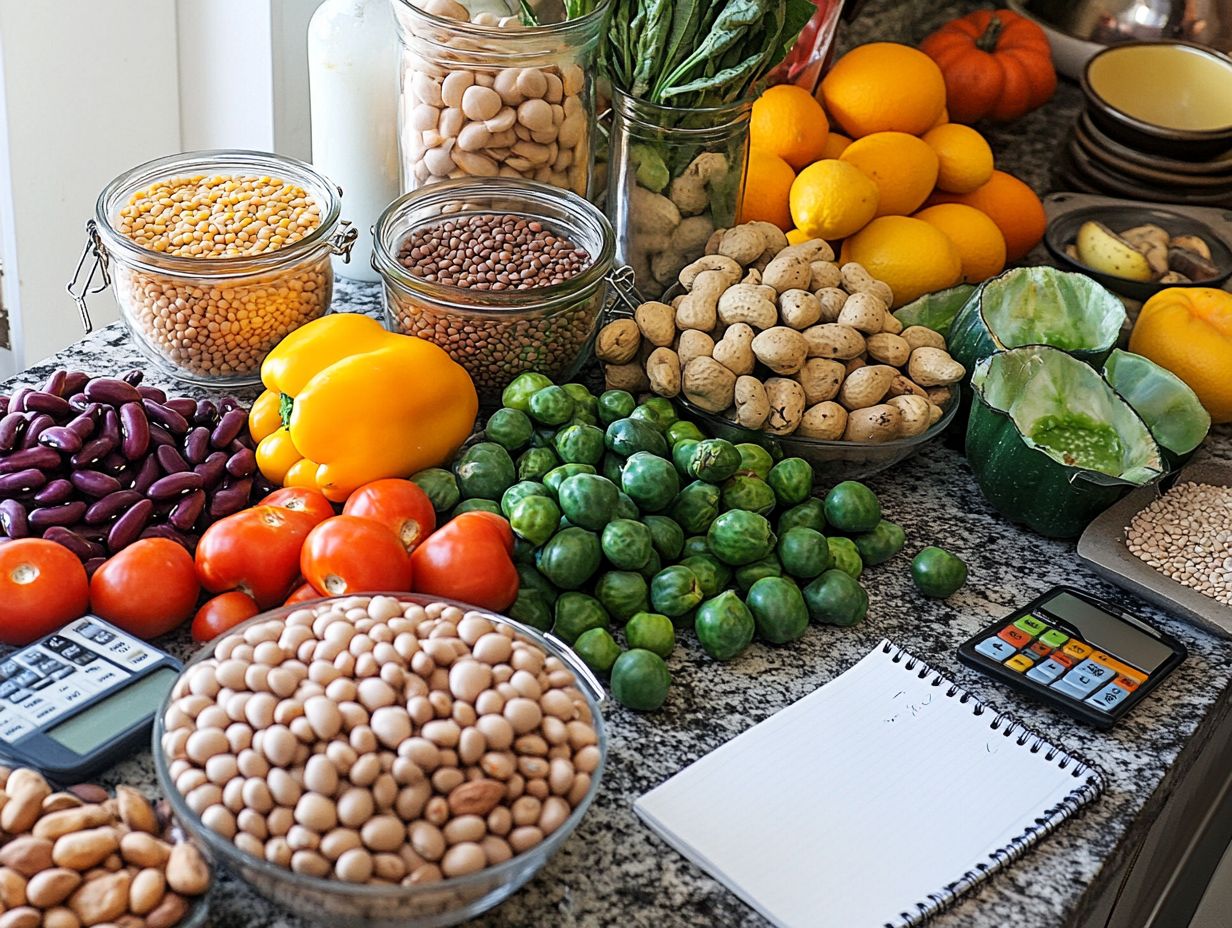 Budget-friendly vegan shopping can help reduce food expenses while enabling individuals to maintain a healthy and balanced diet. This approach highlights the importance of strategic planning and meal prepping as part of a sustainable food system.
Budget-friendly vegan shopping can help reduce food expenses while enabling individuals to maintain a healthy and balanced diet. This approach highlights the importance of strategic planning and meal prepping as part of a sustainable food system.
1. Buy in Bulk
Buying in bulk enables shoppers to save money on a vegan diet by allowing them to purchase staples such as grains, legumes, and nuts at lower prices. Along with the financial benefits, bulk buying helps reduce packaging waste, as larger quantities typically require less plastic and cardboard. This practice positively impacts environmental sustainability by decreasing contributions to landfills and promoting more mindful consumption. Studies on veganism indicate the economic advantages and environmental impact of such practices in high-income countries. To fully enjoy the advantages of bulk buying, effective storage is essential. Keeping bulk items in airtight containers can significantly extend their shelf life and prevent spoilage, especially when stored in a cool, dark place. Additionally, organizing and tracking the levels of these products is important for effective meal planning and waste reduction, further contributing to sustainable food systems.
2. Shop Seasonally
Shopping seasonally is a valuable tip for budget-friendly vegan shopping, as it typically offers fresher produce at lower prices due to seasonal availability, resulting in reduced overall grocery bills. Along with economic benefits, seasonal fruits and vegetables often have better taste and higher nutritional value compared to their off-season counterparts. When produce is harvested just before peak ripeness, it is at its naturally sweetest and most nutrient-rich, enhancing almost any meal. Studies on veganism have shown that shopping seasonally contributes to significant savings and improved dietary patterns. Moreover, purchasing these items supports local farmers and helps reduce the carbon footprint associated with food transportation, further illustrating the environmental impact of such choices. The best seasonal options can easily be found at local farmers’ markets or through community-supported agriculture programs, which are usually just a short drive away.
3. Plan Meals Ahead
Meal planning is an effective strategy for vegans to manage food costs while ensuring they enjoy a diverse range of healthy meals. By planning ahead, individuals can prevent impulse purchases and limit trips to the store, both of which typically lead to higher expenses. The process begins with creating a grocery list that focuses on seasonal foods and pantry staples, enabling a healthy yet affordable diet. Batch cooking allows for the transformation of various vegetables and grains into nutritious meals that can be easily reheated, ensuring there is always a healthy option available, even during busy weeks. Clinical research published in JAMA Network Open suggests that such strategies not only promote healthier dietary records but also contribute to weight loss and improved calorie intake. Additionally, repurposing leftovers can turn one meal into two or three, helping to reduce food waste and maximize the use of every ingredient.
How to Save Money on a Vegan Diet
You can save money on a vegan diet by employing practical strategies that significantly lower food expenses while still providing a nutritious and satisfying meal plan. According to research findings by Oxford University and the Physicians Committee for Responsible Medicine, such dietary changes are associated with health benefits and preventive medicine, helping to mitigate health risks associated with noncommunicable diseases like heart disease and type 2 diabetes.
1. Grow Your Own Produce
Growing your own produce can lead to significant cost savings on a vegan diet, as you can enjoy fresh vegetables and herbs at a much lower price than in stores. This practice not only promotes healthy eating but also fosters self-sufficiency and a deeper connection to the food that nourishes you. Research findings from the National Nutrition Survey indicate that home gardening contributes to dietary change and health improvements. Cultivating a small garden with tomato and basil plants, for example, allows you to experience the satisfaction of consuming food you have grown yourself, fully aware of each step in the growing process. Even if you have limited outdoor space, options such as container gardening or vertical gardens enable you to cultivate a variety of plants. Home gardening can help reduce grocery bills and decrease the carbon footprint associated with transporting food from farms to grocery stores. Starting with small projects, like growing herbs or salad greens in pots, can ignite a passion for gardening that evolves into more ambitious endeavors over time.
2. Buy Frozen Fruits and Vegetables
Purchasing frozen fruits and vegetables is an affordable way to maintain a vegan diet while effectively managing food costs without compromising on nutrition or flavor. Frozen produce typically has a longer shelf life, which helps reduce food waste and facilitates efficient meal planning, ultimately saving money. For those with busy schedules, frozen food options offer great convenience. Imagine having a diverse selection of fruits and vegetables readily available at all times, regardless of the season. This accessibility allows individuals to prepare warm, hearty, and nutritious meals without the need for frequent shopping, particularly since many fresh fruits and vegetables can be out of season and more expensive. According to research findings in Lancet Planetary Health, adopting such strategies contributes to sustainable food systems and significant savings over time. Embracing frozen foods can lead to cost savings and ensure that delicious, healthy meals are always at hand.
3. Substitute Expensive Ingredients
Substituting expensive ingredients with more affordable options is one of the most effective ways to maintain a budget-friendly vegan diet while still enjoying a wide variety of meals. This approach not only broadens the range of flavors available but also encourages creativity in the kitchen. For instance, instead of using costly cashews to create creamy sauces, one can opt for silken tofu or blended sunflower seeds, which are significantly cheaper yet provide similar taste and texture. In terms of plant-based proteins, lentils and beans serve as excellent alternatives to pricier vegan meat products, offering a hearty and nutritious foundation for meals without the extra cost. According to Marco Springmann from Oxford University, such food alternatives contribute to health benefits and lower food prices in high-income countries. Additionally, choosing seasonal vegetables instead of out-of-season options enhances freshness and helps to lower expenses. These substitutions enable individuals to create meals that are both affordable and satisfying, while still being delicious. The Physicians Committee for Responsible Medicine advocates for such dietary changes to promote responsible medicine and reduce health risks.
